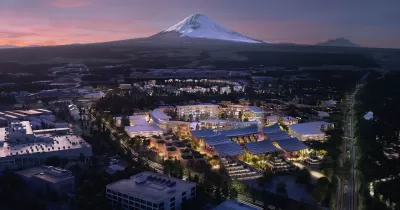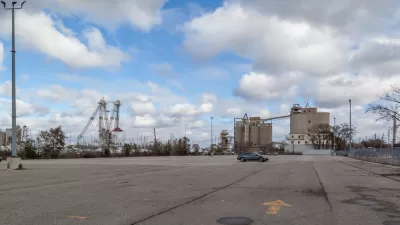Checking in with Toyota's plans for an interconnected smart "city of the future" means considering how their approach might differ from other attempts at similar projects.

Corporate interest in smart city technology has brought numerous concepts and potential projects into the public spotlight in recent years with a notable lack of success in implementing new technologies in a robust way. Where others (most notably, Sidewalk Labs) have failed, Toyota has big plans to create a new, interconnected smart city, a "city of the future" to stand as a proof of concept for such innovations as autonomous vehicles and smart houses.
"The 175-acre Woven City project, to sit at the base of Mt. Fuji, would house some 2,000 residents and will be outfitted with connected infrastructure, clean buildings and artificial intelligence (AI)," writes Jason Plautz on the ambitious scope of the project. Some onlookers think that Toyota could have more success than other corporations who have spearheaded smart city development, in part due to the lessened regulatory requirement involved in building a city from scratch.
Public concern has put a damper on smart city development projects in the past. Alphabet's Sidewalk Labs planned a development on the waterfront of Toronto that sought to "showcase everything from mass timber buildings to adaptive pavement that would accommodate all forms of mobility," but the "project was dogged with concerns about how the company would store and protect data collected from residents," Plautz reflects.
After Toyota's January announcement of plans for the spawning of the Woven City, very few details about the project have been revealed, says Plautz. Nearly a year later, ears are perked for more information about the viability of the project and its implications for smart city technology in other cities worldwide.
FULL STORY: Can Toyota succeed where Sidewalk Labs failed?

Planetizen Federal Action Tracker
A weekly monitor of how Trump’s orders and actions are impacting planners and planning in America.

Congressman Proposes Bill to Rename DC Metro “Trump Train”
The Make Autorail Great Again Act would withhold federal funding to the system until the Washington Metropolitan Area Transit Authority (WMATA), rebrands as the Washington Metropolitan Authority for Greater Access (WMAGA).

The Simple Legislative Tool Transforming Vacant Downtowns
In California, Michigan and Georgia, an easy win is bringing dollars — and delight — back to city centers.

The States Losing Rural Delivery Rooms at an Alarming Pace
In some states, as few as 9% of rural hospitals still deliver babies. As a result, rising pre-term births, no adequate pre-term care and "harrowing" close calls are a growing reality.

The Small South Asian Republic Going all in on EVs
Thanks to one simple policy change less than five years ago, 65% of new cars in this Himalayan country are now electric.

DC Backpedals on Bike Lane Protection, Swaps Barriers for Paint
Citing aesthetic concerns, the city is removing the concrete barriers and flexposts that once separated Arizona Avenue cyclists from motor vehicles.
Urban Design for Planners 1: Software Tools
This six-course series explores essential urban design concepts using open source software and equips planners with the tools they need to participate fully in the urban design process.
Planning for Universal Design
Learn the tools for implementing Universal Design in planning regulations.
Smith Gee Studio
City of Charlotte
City of Camden Redevelopment Agency
City of Astoria
Transportation Research & Education Center (TREC) at Portland State University
US High Speed Rail Association
City of Camden Redevelopment Agency
Municipality of Princeton (NJ)




























